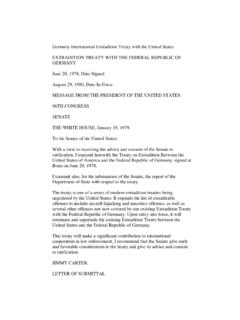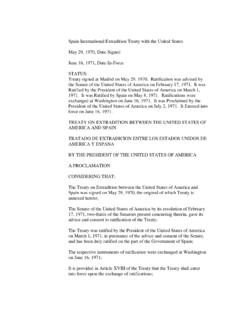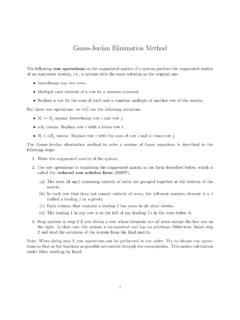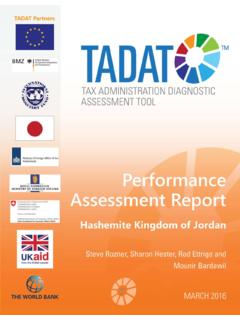Transcription of Jordan International Extradition Treaty with the …
1 Jordan International Extradition Treaty with the United States March 28, 1995, Date-Signed July 29, 1995, Date-In-Force 104TH CONGRESS SENATE LETTER OF TRANSMITTAL THE WHITE HOUSE, April 24, 1995. To the Senate of the United States: with a view to receiving the advice and consent of the Senate to ratification, I transmit herewith the Extradition Treaty between the Government of the United States of America and the Government of the Hashemite Kingdom of Jordan , signed at Washington on March 28, 1995. Also transmitted for the information of the Senate is the report of the Department of State with respect to this Treaty .
2 The Treaty establishes the conditions and procedures for Extradition between the United States and Jordan . It also provides a legal basis for temporarily surrendering prisoners to stand trial for crimes against the laws of the Requesting State. The Treaty further represents an important step in combatting terrorism by excluding from the scope of the political offense exception serious offenses typically committed by terrorists, , crimes against a Head of State or first family member of either Party, aircraft hijacking, aircraft sabotage, crimes against internationally protected persons, including diplomats, hostage-taking, narcotics trafficking.
3 And other offenses for which the United States and Jordan have an obligation to extradite or submit to prosecution by reason of a multilateral International agreement or Treaty . The provisions in this Treaty follow generally the form and content of Extradition treaties recently concluded by the United States. This Treaty will make a significant contribution to International cooperation in law enforcement. I recommend that the Senate give early and favorable consideration to the Treaty and give its advice and consent to ratification. WILLIAM J. CLINTON. LETTER OF SUBMITTAL DEPARTMENT OF STATE, Washington, March 31, 1995.
4 The PRESIDENT, The White House. THE PRESIDENT: I have the honor to submit to you the Extradition Treaty between the Government of the United States of America and the Government of the Hashemite Kingdom of Jordan (the " Treaty "), signed at Washington on March 28, 1995. I recommend that the Treaty be transmitted to the Senate for its advice and consent to ratification. The Treaty follows generally the form and content of Extradition treaties recently concluded by the United States. It represents a concerted effort by the Department of State and the Department of Justice to modernize the legal tools available for the Extradition of serious offenders such as narcotics traffickers and terrorists.
5 This will be the first Extradition Treaty between the United States and Jordan . Article 1 obligates each Party to extradite to the other, pursuant to the provisions of the Treaty , any person charged with or found guilty of an offense described in Article 2. In Article 2, the Parties agree that an offense punishable by both parties by deprivation of liberty or other form of detention for more than one year, or by a more severe penalty shall be extraditable. The Article also provides that attempts and conspiracies to commit these offenses, and participation in the commission of the offenses, are extraditable.
6 Inclusion of a dual criminality clause without a list of offenses covered by the Treaty obviates the need to renegotiate or supplement the Treaty as offenses become punishable under the laws of both parties. Among other things, the Article further provides that in determining whether an offense is covered under the Treaty , the offense shall be considered an extraditable offense whether or not the laws in the Contracting Parties place the offenses within the same category of offenses or describe the offense by the same terminology. with regard to offenses committed outside the territory of the Requesting State, an offense described in this Article shall be an extraditable offense regardless of where the act or acts constituting the offense were committed.
7 Article 3 provides that Extradition shall not be refused based on the nationality of the person sought. Article 4 incorporates a political offense exception to the obligation to extradite. Article 4(1) states generally that Extradition shall not be granted for political offenses. Article 4(2) expressly excludes from the reach of the political offense exception several categories of offenses: (i) a murder or other violent crime against the person of a Head of State of one of the Contracting States, or of a member of the Head of State's family; (ii) an offense for which both Parties are obliged pursuant to a multilateral International agreement to extradite the person sought or submit the case for prosecution ( , aircraft hijacking pursuant to The Hague Convention for the Suppression of Unlawful Seizure of Aircraft, done at The Hague December 16, 1970, and entered into force October 14, 1971.)
8 Aircraft sabotage pursuant to the Montreal Convention for the Suppression of Unlawful Acts Against the Safety of Civil Aviation, done at Montreal September 23, 1971, and entered into force January 26, 1973, and the Protocol for the Suppression of Unlawful Acts of Violence at Airports serving International Civil Aviation, done at Montreal February 24, 1988; crimes against internationally protected persons, including diplomats, under the Convention on the Prevention and Punishment of Crimes Against Internationally Protected Persons, including Diplomatic Agents, done at New York December 14, 1973, and entered into force February 20, 1977; hostage taking, pursuant to the International Convention against the Taking of Hostages, done at New York on December 17, 1979, and entered into force June 3, 1983, and for the United States January 6, 1985.
9 And narcotics trafficking under the United Nations Convention Against Illicit Traffic in Narcotics Drugs and Psychotropic Substances, done at Vienna December 20, 1988, which entered into force November 11, 1990; (iii) a conspiracy or attempt to commit the offenses described above, or participation in the commission of those offenses. Article 4(3) provides that Extradition shall not be granted if the "competent authority" of the Requested State (for the United States, the Secretary of State) determines that the request was politically motivated. Article 4(4) provides that the executive authority of the Requested State can refuse Extradition for offenses under military law which are not offenses under ordinary criminal law.
10 Article 5 bars Extradition when the person sought has been convicted or acquitted in the Requested State for the same offense, but does not bar Extradition if the competent authorities in the Requested State have declined to prosecute or have decided to discontinue criminal proceedings. Article 6 provides that the decision whether to grant a request for Extradition shall be made without regard to provisions of the law of either Contracting State concerning lapse of time. Under Article 7, when an offense for which surrender is sought is punishable by death under the laws of the Requesting State and is not so punishable under the laws of the Requested State, the Requested State may refuse Extradition unless the Requesting State provides assurances that the death penalty will not be imposed or, if imposed, will not be carried out.














